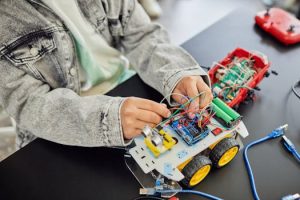The Gig Economy and Education: Preparing Students for Freelance Careers
The gig economy has become an increasingly popular option for workers over the past decade. According to a survey conducted by Intuit, it is estimated that by 2020, 40% of American workers will be independent contractors or freelancers. This shift towards freelance work has not only created new opportunities for workers, but it has also changed the landscape of education. With the rise of the gig economy, it is crucial for educators to prepare students for the world of freelance careers. In this article, we will explore the impact of the gig economy on education and the importance of equipping students with the necessary skills for success in the freelance world.
The Rise of the Gig Economy
The gig economy, also known as the on-demand economy, is a labor market characterized by short-term contracts or freelance work, rather than traditional full-time jobs. This shift in the workforce is driven by advancements in technology and the desire for flexibility among workers. Companies like Uber, Airbnb, and Upwork have disrupted traditional industries and have created a new way of working in which individuals can utilize their skills and services on a project-by-project basis.
In addition, the gig economy offers a variety of benefits for workers, such as the ability to control their own schedule, work from anywhere, and have multiple sources of income. This flexibility and autonomy have attracted many workers, particularly millennials, who are seeking a better work-life balance.
The Impact on Education
As the gig economy continues to grow, it has also affected the education system. In the past, traditional education focused on preparing students for stable, long-term careers. However, with the rise of freelance work, the skills needed for success in the gig economy are vastly different from those needed for traditional careers.
One of the biggest impacts on education is the changing demand for skills. In the gig economy, skills such as project management, communication, and adaptability are highly valued. These skills are not traditionally taught in schools, so educators must adapt and incorporate them into their curriculum to prepare students for freelance careers.
In addition, the gig economy requires individuals to have a diverse set of skills instead of specializing in one area. This means that students must be exposed to a wide range of subjects and have the opportunity to develop various skills, both technical and soft skills, in order to be successful in the freelance world.
Preparing Students for the Gig Economy
1. Encourage Entrepreneurship
Entrepreneurship is a key aspect of the gig economy, as many freelancers also run their own businesses. Encouraging entrepreneurship in the classroom can instill valuable skills such as resourcefulness, creativity, and problem-solving. Educators can set up activities and projects that allow students to think like entrepreneurs and develop an entrepreneurial mindset.
2. Teach Digital Literacy
In the gig economy, technology plays a crucial role in connecting freelancers with clients and managing their work. Students must be familiar with various digital tools and platforms and be proficient in using them for communication, organization, and project management. Teaching digital literacy skills will prepare students for the digital world of freelance work.
3. Emphasize Soft Skills
In the gig economy, soft skills such as communication, adaptability, and time management are highly valued. These skills are not traditionally taught in schools, but educators can incorporate them into their curriculum through group projects, presentations, and problem-solving activities. Emphasizing the development of soft skills will better prepare students for the demands of the gig economy.
4. Introduce Real-World Projects
Introducing real-world projects in the classroom can bridge the gap between traditional education and the gig economy. These projects can provide students with hands-on experience and allow them to apply their skills and knowledge to real-world situations. It also teaches them how to work independently and collaborate with others, essential skills for success in the gig economy.
Conclusion
The gig economy has revolutionized the way we work and has significant implications for education. Educators must adapt their teaching methods to prepare students for the shifting job market and equip them with the skills needed to thrive in the gig economy. By incorporating entrepreneurship, digital literacy, soft skills, and real-world projects into their curriculum, educators can better prepare students for freelance careers and ensure their success in the ever-evolving world of work.









